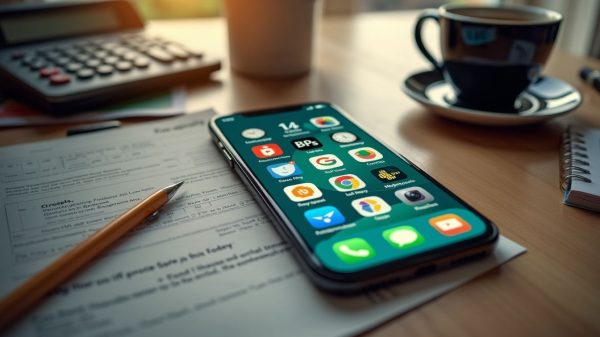You’re tired of living paycheck to paycheck. Automating finances can help individuals manage their savings effortlessly. This article will show you smart budgeting hacks to save money and achieve financial freedom.
Get ready to take control of your finances.
Key Takeaways
- Always automate your money management tasks using tools such as Tillers, CHIME for saving, spend tracking as well as spend rounding up purchase prices. Leverage free QAPITAL cash on hand visibility which is known to enable and make us keep money long-term instead of frequent money spending – This results is more amounts to spend than one typically could if QAPITAL visibility system feature is off in all aspects of savings – In saving more monies one essentially enables automatic spending without a thought but more of good spend instead.
- Get cash so that money expenses visibility shows to all thus preventing possible spend as now all to see – Set up own envelop system first by starting planning what that cash buys which if exceed one drops from such.
- Implement buy things preplan based grocery item make prior check of needed cash in before proceeding grocery go reduce wasting – If money left may be good keep or choose donate others such money saved now money one hold grows.
If helpful or something extra information.
More examples such ‘Avoid Upgrades to electronic devices thus buy on ‘sales discount price. Take phone last 3, 3 to 8 years after good invest monies $17K yields good after investing smart on such proceed way save those money amount by doing wait or first not all then after year go.’ More information please go visit library book such borrow thing bike if something borrowed, share others who you can go to.’
Automate Your Finances

Automate Your Finances
Money management is easy when you automate it. Set up automatic transfers from your checking to your savings account. This way, you save money without thinking about it. Tools like TILLER and CHIME can help you do this.
They also help you track your spending. You can even round up purchases to the nearest dollar for extra savings. This may not seem like much, but it adds up over time. Digital cash envelope systems like QAPITAL also help you stay on top of your spending.
This way, you know exactly where your money is going. With these tools, saving money becomes a habit.
Try a Cash-Based Spending System
We all spend money differently. But how we pay can change how we spend. Try using cash. Paying with cash makes spending more real. When we see money leave our hands, we feel the loss more.
To use a cash-based system, plan how much to spend in each category, such as groceries or dining out. Take out the cash you plan to use. Use only that money until it is gone. When you can see how much is left, you can choose to spend or not spend more wisely.
Using cash can also save money by avoiding card fees and overdraft charges. This is the Envelope Budgeting method. Try it out to see if using cash works for you.
Make a List Before You Go Shopping
You walk into a grocery store and see sale signs everywhere. But do you really need those items? Making a list before shopping helps you avoid buying things you don’t need.
Your list should have items like sandwich bread, ground beef, pasta, and frozen fruits. This helps you make a meal plan and cuts down on food waste. Focus on what you really need, not just what’s on sale.
This will save you money and reduce impulse buys.
Buy Generic or Store-Brand Items
Big-box stores like Costco offer generic brands. These brands are often cheaper than name brands. Great Value, Kroger, and Amazon Basics are good examples. They offer the same quality as name brands but at a lower price.
Generic brands can save you 20-30% on over-the-counter medications. This can be $0.50 to $4.00 per item. Buying generic brands for items like food, cleaners, and paper products can also save you money.
Consider buying store-brand items instead of name-brand items to cut costs on everyday items.
Eliminate Buying Things You Don’t Need
Cut out stuff you don’t use. Gym memberships and lottery tickets are a waste of money if you don’t use them.
Magazine subscriptions and cable TV can also drain your wallet. Don’t buy souvenirs that just collect dust. These impulse buys can add up fast. They can cause financial stress. This stress affects your mental health and productivity.
Effective budgeting reduces financial anxiety. Be smart with your money. Cut out unnecessary expenses. Your wallet – and your mind – will thank you.
Keep an Eye Out for Price Drops
Big sales events like Black Friday and Cyber Monday come once a year. Plan your purchases around these events to save big. Walmart’s Black Friday and Amazon Prime Day are great examples of sales periods to look out for.
Keep an eye on your favorite online retailers for price drops. Sign up for their email newsletters or follow them on social media to stay informed. Some stores offer price matching, so if you buy something and it goes on sale later, you can get a refund for the difference.
Stick with Your Current Phone
Sticking with your current phone can save you money. It’s simple: avoid upgrading and invest the savings instead. If you invested $1,000, it could yield about $17,000 in 30 years. Upgrading your phone often can be expensive.
New phones can cost over $1,000. Buying a new phone every year can be a big expense. Sticking with your current phone saves you from overspending on upgrades. You can use that money for something else.
Like paying off high-interest debts or investing in a tax-free savings account.
Borrow or Rent Items You’ll Only Use Once or Twice
Renting items you’ll only use once or twice can save you money. For example, you can rent a tuxedo for a wedding instead of buying one. This way, you won’t have to spend a lot of money on something you’ll only wear once.
You can also rent tools or equipment for projects around the house. Many hardware stores offer rental options for things like power tools or lawn equipment. This can be cheaper than buying the tools outright, especially if you only need them for a short time.
Some cities even have “libraries of things” where you can borrow items like bikes, tools, or musical instruments. This way, you can try out something new without committing to buying it.
Price Match with Other Retailers When You Can
You can save money by price matching with other retailers. Some stores offer this deal. They will match a lower price if you find one at another store.
Home Depot, Lowe’s, and Best Buy do this. They want to keep you as a customer. If you find a lower price, show them the ad or photo. They may even beat the competitor’s price. This can save you a lot of money on big items.
Make Money-Saving Home Upgrades
Making home upgrades can save you money. One easy way to start is by lowering your thermostat at night or when you’re away from home. This simple change can lower your heating and cooling bills.
Using energy-efficient appliances also helps. For example, wash clothes in cold water and line dry. This saves energy and money. Another idea is to grow herbs and vegetables at home.
This way, you’ll have fresh food and save on grocery shopping. Change air filters frequently to keep your HVAC system running well.
Ditch Your Cable Provider
Ditching your cable provider can save you money. Many people pay around $50 per month for cable. After cutting cable, your monthly expenses can drop to around $42. You will need to buy some equipment, like a streaming device.
This costs around $175.
You can watch your favorite shows on streaming services like Hulu or Netflix. They are cheaper than cable. You can also watch on-demand TV shows and movies. No more waiting for your favorite show to come on.
You can watch it whenever you want.
Conclusion
Smart budgeting is not about depriving yourself, but about making smart choices. You work hard for your money. Use these hacks to keep more of it. Be smart, be savvy, and save big!
References
- https://wintradoacademy.com/automate-your-finances/ (2024-07-10)
- https://www.forbes.com/sites/peterlazaroff/2018/01/17/how-to-automate-your-finances-in-5-easy-steps/ (2018-01-17)
- https://www.atypicalfinance.com/electronic-cash-only-budgeting/
- https://www.bankrate.com/banking/savings/cash-stuffing-budgeting/
- https://blog.leaderscu.com/smart-shopping-hacks-to-save-money (2024-01-12)
- https://www.accruesavings.com/post/saving-money-hacks
- https://phys.org/news/2010-05-brands-money-dont.html (2010-05-26)
- https://www.thebudgetmom.com/how-i-save-money-every-month-buying-generic-brands/
- https://www.ncbi.nlm.nih.gov/pmc/articles/PMC10645357/
- https://www.cnbc.com/2019/09/11/how-no-spend-tactics-can-help-you-save.html (2019-09-11)
- https://fastercapital.com/content/Budgeting–Zero-Percent-Budgeting-Hacks–Stretching-Your-Money-Further.html
- https://www.flanaganstatebank.com/the-spenders-guide-to-saving-money/
- https://www.theguardian.com/money/article/2024/may/06/how-rental-libraries-of-things-have-become-the-new-way-to-save-money
- https://www.budgetsavvydiva.com/2016/09/stores-price-matching-policies/
- https://prisync.com/blog/price-matching/
- https://www.h2horganizing.com/blog/2024/8/23/update-on-a-budget-7-money-saving-tips-for-extensive-home-upgrades
- https://www.viewtennesseehomes.com/blog/dollar-saving-hacks-10-ways-to-save-money-on-house-renovations/ (2024-06-12)
- https://www.wisebread.com/cutting-the-cable-cord-has-more-than-financial-benefits
- https://cccnews.info/2024/06/27/yes-cutting-cable-tv-really-does-save-money-heres-a-step-by-step-explanation/ (2024-06-27)






